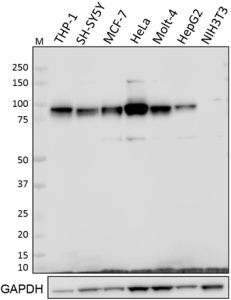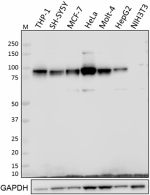- Clone
- W15091A (See other available formats)
- Regulatory Status
- RUO
- Other Names
- Aryl hydrocarbon receptor nuclear translocator (ARNT), Class E basic helix-loop-helix protein 2 (bHLHe2), Hypoxia-inducible factor 1-beta
- Isotype
- Mouse IgG1, κ
- Ave. Rating
- Submit a Review
- Product Citations
- publications

-

Total cell lysates (15 µg total protein) from THP-1, SH-SY5Y, MCF-7, HeLa, Molt-4, HepG2, and NIH/3T3 cells were resolved by 4-12% Bis-Tris gel electrophoresis, transferred to a nitrocellulose membrane, and probed with 0.5 µg/mL (1:1000 dilution) of Purified anti-HIF1-β Antibody, clone W15091A, overnight at 4°C. Proteins were visualized by chemiluminescence detection using HRP goat anti-mouse IgG Antibody (Cat. No. 405306) at a 1:3000 dilution. Direct-Blot™ HRP anti-GAPDH Antibody (Cat. No. 607904) was used as a loading control at a 1:50000 dilution (lower). Lane M: Molecular Weight marker.
Hypoxia-inducible factor 1 beta (HIF1-β), also known as Aryl Hydrocarbon Receptor Nuclear Translocator (ARNT), functions mainly as a transcription factor. This protein contains a basic helix-loop-helix domain, two PAS (PER-ARNT-SIM) domains and one PAC (PAS-associated c-terminal) domain. HIF1-β binds to the ligand-bound aryl hydrocarbon (Ah) receptor and helps the complex move from cytosol to the nucleus, where it promotes the expression of xenobiotic metabolism-related genes. HIF1-β is also involved in cellular senescence and HIF-1 transcription factor network. It forms a heterodimer with HIF1-α or EPAS1/HIF2A and transcriptionally regulates the response to hypoxia. There are multiple transcript variants of HIF1-β generated by alternative splicing.
Product DetailsProduct Details
- Verified Reactivity
- Human
- Antibody Type
- Monoclonal
- Host Species
- Mouse
- Immunogen
- Partial human HIF1-β recombinant protein (517-691 a.a.) expressed in E. coli.
- Formulation
- Phosphate-buffered solution, pH 7.2, containing 0.09% sodium azide.
- Preparation
- The antibody was purified by affinity chromatography.
- Concentration
- 0.5 mg/ml
- Storage & Handling
- The antibody solution should be stored undiluted between 2°C and 8°C.
- Application
-
WB - Quality tested
- Recommended Usage
-
Each lot of this antibody is quality control tested by Western blotting. For Western blotting, the suggested use of this reagent is 0.5 - 2.0 µg per ml. It is recommended that the reagent be titrated for optimal performance for each application.
- Application Notes
-
Clone W15091A does not cross-react with mouse.
- RRID
-
AB_2629788 (BioLegend Cat. No. 689602)
Antigen Details
- Structure
- 789 amino acids with a predicted molecular weight of 86.6 kD. Contains a bHLH (basic helix-loop-helix) domain, a PAC (PAS-associated C-terminal) domain, and two PAS (PER-ARNT-SIM) domains.
- Distribution
-
Nucleus
- Function
- HIF1-β interacts with ligand-bound aryl hydrocarbon receptor (AhR) and acts as a transcriptional co-activator for the genes involved in xenobiotic metabolism.
- Interaction
- Forms a heterodimer with AHR, AHRR, HIF1A, EPAS1/HIF2, and other bHLH proteins. Interacts with TACC3 and NOCA7.
- Biology Area
- Cell Biology, Transcription Factors
- Antigen References
-
1. Furue M, et al. 2014. Arch Dermatol. Res. 306:769.
2. Vorrink SU, et al. 2014. Chem. Biol. Interact. 218:82.
3. Mandl M, et al. 2014. Mol. Med. 20:215.
4. Gu C, et al. 2014. Leuk. Res. 37:1750.
5. Wolff M, et al. 2013. Cell Physiol Biochem. 32:849.
6. Nakajima K, et al. 2013. Nat. Commun. 4:2112. - Gene ID
- 405 View all products for this Gene ID
- UniProt
- View information about HIF1-beta on UniProt.org
Related Pages & Pathways
Pages
Related FAQs
Other Formats
View All HIF1-β Reagents Request Custom Conjugation| Description | Clone | Applications |
|---|---|---|
| Purified anti-HIF1-β | W15091A | WB |
Compare Data Across All Formats
This data display is provided for general comparisons between formats.
Your actual data may vary due to variations in samples, target cells, instruments and their settings, staining conditions, and other factors.
If you need assistance with selecting the best format contact our expert technical support team.
-
Purified anti-HIF1-β

Total cell lysates (15 µg total protein) from THP-1, SH-SY5Y...







Follow Us